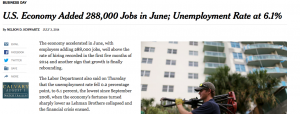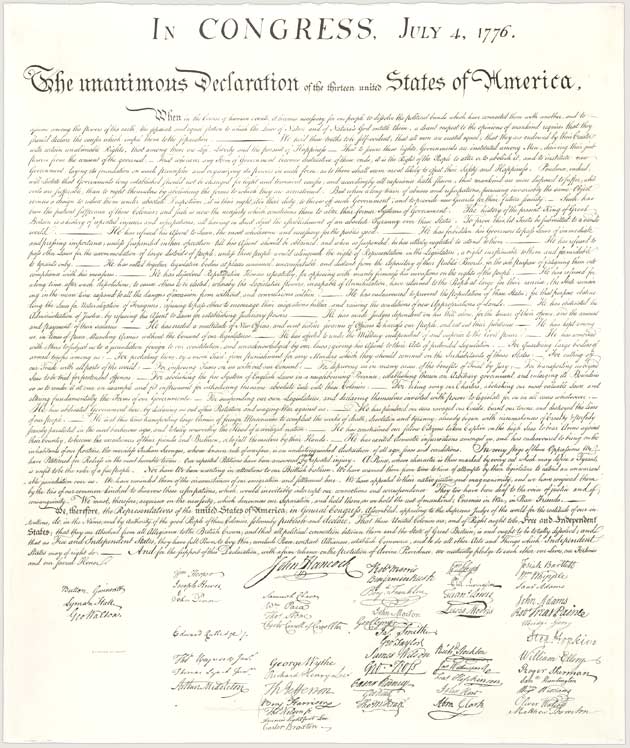One of the things I truly like — no irony — about neoclassical economics is that, insofar as there are literally hundreds of variables whose relative weights shift in relationship to one another, we can talk sensibly about a nearly infinite variety of “what ifs.” This is surely the case with June’s jobs numbers. What if we dropped taxes on capital gains by .25? What if we dropped taxes on the bottom third quartile by .4? What if we decreased the national debt by increasing taxes on the top 1 per cent, or even the top .1 percent by .25? All of these “what ifs” can be plugged into models to produce predictions of where the economy will be in, say, six months, a year, three years, and so on.

One of the variables that economists should be talking about in the next news cycle is: “What might have happened if Congress had approved the $1.2T stimulus that ALL — yes ALL — professional economists recommended back in 2008?” That is a strange claim. All? Yes, all. Which is extremely odd. What would have happened? Well, for one, there would be greater consumer demand and, ergo, greater production, greater tax revenues, greater paying down on debt, cheaper money, etc., etc., etc. That is to say, most of the professional economists who weighed in on this issue were thinking about economic growth.
But what if the real problem in 2008 was not unemployment or underemployment or underconsumption? What if the real problem in 2008 was an under regulated global economic system that is reluctant to compel investors to demonstrate the value of their assets because, were they compelled to demonstrate the value of their assets this would show their assets wanting and would draw financial capital out of global markets and deprive speculators their return on investment?
But obviously, this only pushes the question back one step. Let’s say the asset base really isn’t there? Then what? Most economists — even progressive economists — would say that in this case the market is overvalued and, therefore, that the reduction in value is painful, but necessary. (This pain can be reduced by responsible, targeted deficit spending that places money in the pockets of consumers and allows them to pay back the deficit gradually through economic growth until T[n].) But, again, what if we do not really need any more economic growth? What if the problem is that, owing to the spectacular efficiency of technology and science, we really do not need people to work as much or as hard; but that the only reason people need to work as much and as hard is to produce spectacular returns for investors? In other words, what if the problem of 2008 was not about wealth — material wealth — the kind of wealth that people can wear, and eat, and drive, and listen to, and fly; but was instead about immaterial value, the immaterial value that speculative investors need in order to invest and that they invest in order to have more?
But, more of what? Well, more overly value, and ultimately inscrutable assets of course. And why inscrutable assets? Well because only those assets — assets that fly under the regulatory radar — are able to produce returns outside of the window of actual asset valuation. But, again, here is the beauty and brilliance of neoclassical economic theory. What is any asset worth, even a non-tangible asset? In neoclassical economic theory, that asset, call it a “pet rock,” is worth whatever buyers are willing to pay for it. Let’s say I have convinced buyers that my pet rock is worth $25. I sell 100,000 of my pet rocks and then have builders build a house for me. Real jobs. Real house. Real neighborhood. Garden. Schools. Etc. Real economic growth. Was the pet rock really worth 2.5M? Evidently it was.
But let us now say that what people really needed in 2008 was not pet rocks, but houses, schools, hospitals, universities, roads, parks, museums, etc. And, let us say that investors, looking at this range of things that people needed, said to themselves: “How am I supposed to turn a profit off of houses, schools, hospitals, universities, roads, parks and museums? Those are real things, with known values; values that are not really very spectacular. I’ll take the pet rock.” And, yet, it is the pet rock that, at the end of the day, will lead to a burst bubble and a market collapse.
Maybe, then, the question we should be asking is not how we can pump up the economy, how we can achieve economic growth, but how we can produce the things and services that people really need. Do we need economic growth? Maybe not. Maybe public hospitals will not bring economic growth. But we do need hospitals. Will another, better school bring economic growth? Probably not. But that is what we need. Moreover a better public school will probably make a better society, but may not bring economic growth.
The real question, then, is how do we want to carve up the pie? We can send it up the line to the 1 per cent. And then we can trust that they will create the growth that will create the schools, hospitals, parks, museums, etc. Or we could simply say, “We want the schools, hospitals, parks, museums, etc.” So let’s spend our social dividend there. But, oh, will that make the 1% angry. And, did I mention, the 1% are the guys who own our Congress?



